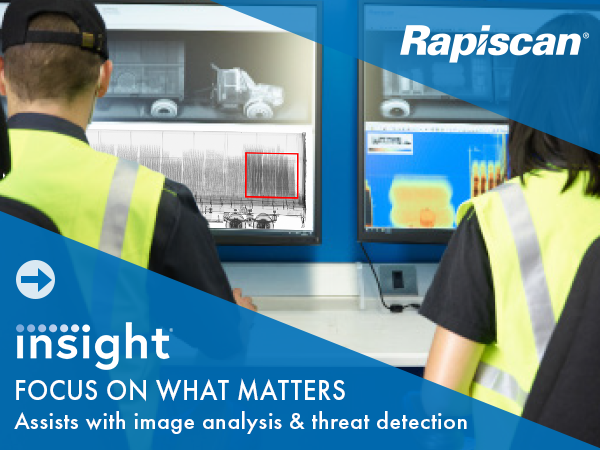UFF 3.0.0: the new WCO-sponsored standard shaping the future of NII
22 June 2025
By the WCO SecretariatIn July 2019, the WCO released the first operational version of the Unified File Format (UFF 2.0) – a non-proprietary data format for the data generated by high-energy scanners used for the inspection of trucks, containers and railway wagons. The new standard was developed with a view to facilitating the interoperability of non-intrusive inspection (NII) equipment provided by different manufacturers, the streamlined centralization of image analysis functions into a remote and central command centre, the easy exchange of images with other Customs administrations, and the development of large libraries of images necessary to train analysts or develop automated threat detection applications.
Uptake
Customs administrations wishing to deploy UFF 2.0 in their operations were invited to include the use of the standard as a requirement in their tender documents when purchasing or upgrading NII systems.[1] Many administrations complied with this recommendation, including the United Kingdom Border Force (UKBF) and the United States Customs and Border Protection (CBP). All European Union (EU) Member States wishing to receive financial support under the EU Customs Control Equipment Instrument (CCEI), a 1-billion-euro fund introduced in 2021, also had to do so. Moreover, Dutch Customs decided to make the UFF the standard format of the library of images of scanned containers that the Administration is building with the support of other Customs administrations as part of its efforts to develop automated threat detection algorithms.
Laying the groundwork for an upgrade
UFF 2.0 had been developed by a team comprising representatives of four major NII vendors, namely L3 (now part of Leidos), Nuctech, Rapiscan and Smiths Detection under the umbrella of the WCO Technical Experts Group on NII (TEG-NII). The growing adoption of the standard encouraged the development team to upgrade the UFF while triggering the interest of other NII industry actors. In November 2021, members of the TEG-NII agreed on the criteria such actors should meet in order to join the Group, and, in the following months, membership status was granted to Symetrica, CGN Begood Technology and Varex Imaging, while SGS, CASRA and MultiControl were granted observer status.
In November 2022, TEG-NII members discussed and endorsed a UFF Maintenance Procedure and specified three types of UFF releases:
- major releases which require a changeover strategy and a formal announcement to all WCO Members that clearly articulates the rationale for the changes;
- medium releases that are expected every two years;
- minor releases to reflect minor changes to the UFF standard.
They also established a UFF Maintenance Virtual Steering Group to oversee the implementation of the procedure.
Adding value through UFF 3.0.0
At its first meeting in November 2023, the Steering Group members considered eight proposals for changes to UFF 2.0 and recommended to proceed with a major release. The proposed changes were aimed at supporting an Application Programming Interface (API) to exchange NII data, catering for better material discrimination for lower energy systems, adding metadata to support a message-based transactional process instead of simple file transfers, and incorporating data from Radiation Portal Monitors (RPMs), as well as additional data to support machine-learning algorithms.
The Steering Group recommendation was endorsed by TEG-NII members, and work began on all proposals in early 2024, with the exception of the proposal related to the development of an API for transmitting UFF data. Although the name of the standard remains the same for the time being, it is no longer solely a file format.
As this is a major release, once it was endorsed by the TEG-NII and the SAFE Working Group, the draft UFF 3.0.0 Technical Specifications were submitted to the Policy Commission as early as December 2024 and published on the WCO website as an interim/provisional standard to enable NII industry actors that are not part of the TEG-NII to prepare for UFF 3.0.0 implementation and Customs administrations to include UFF 3.0.0 requirements in their calls for tenders. The changeover strategy and formal announcement to all WCO Members that clearly articulates the rationale for the major release of the UFF will be prepared by June 2025. At that point, the draft UFF 3.0.0 Technical Specifications will be submitted to the Council for final approval.
Transition
The TEG-NII industry members are fully committed to implementing UFF 3.0.0, and other industry stakeholders are also expected to adopt the standard swiftly. They will support both UFF 2.0 and UFF 3.0.0 for a limited period to facilitate the transition, and Customs administrations are encouraged to include a UFF 3.0.0 requirement in future calls for tenders in order to accelerate its adoption.
While UFF 3.0.0 introduces significant changes, the UFF 3.0.0 implementation burden is expected to be minimal, especially for the NII industry actors and Customs administrations with experience in deploying UFF 2.0.
Going forward
The enhancement of the UFF will continue with the development of an API to facilitate the seamless transfer of NII data. The API-related changes will be introduced through a future release of the standard.
Given the multiple benefits to be derived from having a UFF, WCO Members are urged to consider participating in future meetings of the TEG-NII in order to provide input on the further development of this global standard and demonstrate their full support for the initiative.
More information
facilitation@wcoomd.org
[1] See https://mag.wcoomd.org/magazine/wco-news-89/customs-and-industry-collaborate-to-develop-a-unified-file-format-for-non-intrusive-inspection-devices/.

